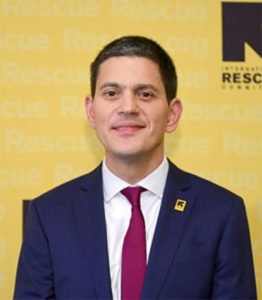International humanitarian law under siege – David Miliband
Head of the global refugee charity the International Rescue Committee and former British Foreign Secretary David Miliband has called for nations and individuals to defend international humanitarian law which he says is under threat from rising nationalism and xenophobia.
In accepting the prestigious Wolfgang Friedmann Memorial Award at Colombia University, in New York, Mr Miliband said that in many places in the world rule of law has b een replaced by the rule of the “iron fist”.
een replaced by the rule of the “iron fist”.
He said this has left some of the most vulnerable communities – political dissidents, innocent civilians, ethnic minorities, women, children, and the LGBTQ community – with few protections against the whims of the powerful.
Professor Friedmann was a Jewish German-American legal scholar specialising in international law, who famously challenged the rise of Nazism through the German courts risking imprisonment or death.
“It’s been a long time, and is a long way, from the world of Professor Friedmann in 1930s Germany to the exodus of Syrians today from their home country, or Rohingya from Myanmar,” Mr Miliband said.
“But my argument tonight is that there is more in common between those stories which sets them apart; that we need to honour the legacy of people like Professor Friedmann by defending our world against those who would allow an age of impunity, disregarding the norms and rules of international humanitarian law so assiduously built up to learn the lessons of the first half of the 20th century; and that the legal community in the US has a distinctive and important role to play in helping to push back against the retreat from those norms and laws,” he said.
“I hope you will all pick up Professor Friedmann’s baton,” Mr Miliband said.
He said the great ambition of the post-World War II pioneers was to use international law as a lever to improve the lives of the most vulnerable and particularly civilians facing the plight of the state or stateless refugees.
“They believed international law could serve as a check on the abuse of power and help build an international system that had progressively greater restraints on such abuses,” Mr Miliband said.
“The great leaders of the post-war era like Eleanor Roosevelt understood that power corrupts, and they were determined to ensure that absolute power could not corrupt absolutely,” he said.
“This legal regime – international humanitarian law, the international conventions on human rights and on refugees, the conventions on the rights of the child – is, however, in retreat in the places where we work.
“Every day, our aid workers face the risk of assault and intimidation, the risk that our facilities will be bombed, that our right to deliver humanitarian aid will face interference,” Mr Miliband said.
He said most concerning was that the retreat from international law is no longer confined to failed states.
“Every type of regime is getting worse. Liberal democracies are becoming more intolerant. Illiberal democracies are electing authoritarian personalities. Authoritarian regimes that once coexisted with pockets of opposition no longer see the need to bother,” Mr Miliband said.
“In other words, the retreat is at home as well as abroad. It is creeping into our own societies, into long-standing democracies built in theory around a respect for the rule of law. Nowhere is this more evident than in the abrogation of the rights of refugees and asylum-seekers,” he said.
Mr Miliband included Australia in the retreat from the rule of international law.
“Last fall the UN called an Australian policy of arbitrarily detaining and separating refugee families a breach of multiple articles of the universal declaration of human rights and the international covenant on civil and political rights,” he said.
“Similarly, what is happening today on the US southern border can only be described as not just a flouting of our moral obligations to people fleeing violence and persecution, but a direct violation of both domestic and international law on the rights of asylum,” he added.
He said that humanitarian law underpinned the unprecedented period of peace and prosperity that followed WWII.
“My message, or plea, tonight is that we need your help to defend and restore the regime of human rights that was so important to the unprecedented period of peace and prosperity that defined the second half of the 20th century. Though we should not put all our hopes in the hands of the law, the law should be a critical partner for social change,” he said.
He called on people in the liberal democratic world to: fight to uphold the principles of their own constitutions; to push countries to uphold their international commitments and: to help strengthen the efforts of NGOs to promote the legal rights of vulnerable people.
“Professor Friedmann, under threat of imprisonment and death, chose to use the law to fight for accountability and the legal rights of German citizens targeted by the Nazi government,” Mr Miliband said.
“He stood up for the rule of law in an age of impunity. As we face the danger of a new age of impunity, I ask you to honour Professor Friedmann’s legacy by standing up for the rule of law today, nationally and internationally, in your own work and in ours,” he said.
Read the speech in full: https://www.rescue.org/press-release/speech-rt-hon-david-miliband-columbia-university-wolfgang-friedmann-award
Laurie Nowell
AMES Australia Senior Journalist












